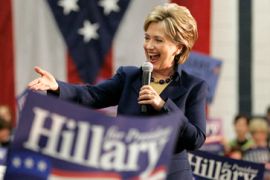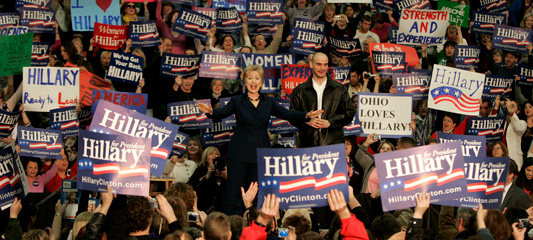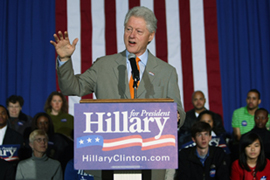Candidates court superdelegate vote
The US Democratic presidential race could be decided by party insiders.

 |
| Superdelegate support could prove crucial for Hillary Clinton [EPA] |
Nancy Kaptur, a Democratic congresswoman, is a highly sought after person these days.
“They do everything, they send their friends that may know us,” the Ohio politician says.
“Former staff members that may have worked for us, people you haven’t talked to in 20 years will call you.”
| In focus |
Kaptur is one of a rare species: she’s a Democratic superdelegate.
Superdelegates include governors, senators, congressmen, members of the party national committee and even former top democrats, like Al Gore, Bill Clinton and Jimmy Carter.
“A superdelegate is a funny term to describe essentially what is a party insider,” says Rob Ritchie.
He is the national director of Fairvote.org, a group that advocates fair and inclusive democratic processes.
“About half of them are elected officials. They make up about a quarter of all the delegates, who get to cast a ballot when their party convenes in August and chooses the nominee,” Richie says.
Most delegates are elected in state primaries or caucuses.
They have pledged support for a particular candidate, and must cast their ballot for that candidate at the party convention in August.
Wooing voters
But the 795 superdelegates are ‘unpledged’, meaning they can vote for whoever they want.
In this year’s hard-fought campaign, some think superdelegates might tip the balance to one candidate or the other. The campaigns are paying plenty of attention to them.
“They are being courted and lobbied, and the whole process is not one that is very pretty,” Richie says. “You certainly see use of proxies, Bill Clinton, Chelsea Clinton and Barack Obama has his allies too that are calling people up and wooing them.”
About 550 superdelegates have declared who they will vote for, and thanks to lots of personal lobbying early on, Clinton has about 50 more of them than Obama, even though the Illinois senator is ahead of Clinton in pledged delegates.
 |
|
Bill Clinton is one the superdelegates |
With millions of voters having cast ballots in primaries this year, the US system of selecting party nominees is arguably more democratic and inclusive than anywhere else.
But some possible scenarios fill democratic activists with dread: namely, the notion of powerful superdelegates tipping the balance and perhaps overruling the popular vote for Obama in favour of Clinton.
Undecided superdelegates
Decades ago, such behind-the-scenes dealmaking – usually held in some cigar smoke-filled back room – was a common way of picking party nominees.
But a modern day version of the smoke-filled room dealmaking could split the party and wreck its chances of regaining the White House in November.
“I think you would have a lot of disillusioned young people; a lot of disillusioned independent voters,” Richie says.
“In this 21 century people want their votes to count and people want their votes to mean something. The idea that unelected party leaders can come in and make final decision is not a 21st century vision of democracy.”
The prospect of a brokered convention, however, is growing more remote.
As Obama has steadily racked up primary wins since Super Tuesday, more and more undecided superdelegates are following the voters’ lead and moving into his column – some even switching over from Clinton’s side.
So don’t break out those cigars yet, superdelegates. That smoke filled back room may not be needed, after all.
